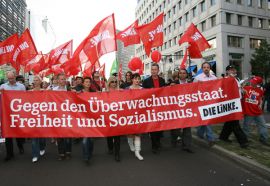Die Linke
Positive developments in the European left

By Ian Angus
Germany: Big gains for Die Linke as Social Democrats’ support collapses

By Duroyan Fertl
October 5, 2009 – Germany’s ``centre-right’’ Chancellor Angela Merkel was returned to power in federal elections held on September 27, but with a record low voter turnout and an increased vote for the far-left party, Die Linke (The Left).
The election was a clear success for Merkel and her Christian Democratic Union (CDU). Her preferred coalition partner – the free-market fundamentalist Free Democratic Party (FDP) – increased its support by 4.8 per cent to an all-time high of 14.6 per cent, enough to form a CDU-FDP government. The FDP will now replace the CDU’s main rival – the ``centre-left’’ Social Democratic Party (SPD) – as coalition partner in the government of Europe’s largest economy.
At the same time, the SPD’s support collapsed by more than 6 million votes, dropping a massive11.2 per cent to only 23 per cent – its worst result since World War II. As one leading SPD member pointed out on election night, “We have been bombed back into the Weimar Republic”. SPD leader Walter Steinmeier described the result as “a bitter day” for German social democracy.
A balance sheet of the European elections

By François Sabado
Germany: Die Linke, Hesse and the `super election’ year

By Duroyan Fertl
Videos: European revolutionaries discuss left unity experiences
The British socialist newspaper Socialist Resistance on June 28, 2008, sponsored a fascinating day of discussion and debate on building broad left parties across Euro
Germany: Die Linke, one year on (+ video)
By Thies Gleiss
One year after the foundation of the Die Linke (Left) party, commentators on both right and left agree that the political situation in Germany has been changed. Following three regional elections in spring 2008, Die Linke is solidly installed on the landscape.[1] On paper it is now the third biggest party in the country, whether in terms of members, elected representatives or other holders of paid political functions at all levels of the state, or again in terms of financial strength.
* * *
Germany's Die Linke: ‘We have the wind of history in our sails’
By Duroyan Fertl
May 30, 2008 -- After a year of stellar successes, almost 600 delegates from Germany’s new left-wing party, Die Linke, came together for the party’s first ever congress, held in the east German city of Cottbus on May 25 and 26. Former East German communist Lothar Bisky and former Social Democratic Party (SPD) national president Oscar Lafontaine, once dubbed by the media as “Europe’s most dangerous man”, were re-elected as co-chairs of the party, and a social justice-oriented platform was adopted for the coming period, which includes state elections in Bavaria this September and federal elections next year.
Die Linke was officially formed in 2007 as a fusion between the Party of Democratic Socialism (PDS — the successor to the former East German ruling party) and a collection of militants, unionists and socialists from the west organised as the Electoral Alternative for Jobs and Social Justice (WASG). Die Linke now has almost 80,000 members.
London, June 28, 2008: Socialist Resistance Day School on broad left parties
You can download the flyer for the Socialist Resistance day school on the European experience of broad parties here. We will have speakers from the Communist Party, the Greens, the LCR, Left Bloc and the Dutch Socialist Party plus your usual favourites.
Left regroupment: issues and prospects
The left in Britain has been better at coming apart than coming together in the last year. Gregor Gall, a member of the Scottish Socialist Party, examines the prospects for left regroupment in Britain and Scotland, and looks to Europe to see if there are lessons to learn.
***
Video: A new European socialist movement? The rise of the the Left party in Germany
The emergence of the Left party (Linkspartei) in Germany is the most significant development of a new political party to the left of social democracy in decades in Europe. The formation of the Left party coincided with the anti-G8 mobilisation in Germany a year ago. It was followed by a startling rise in the opinion polls, and political break-throughs in West Germany, building on its political base in East Germany and the old Party of Democratic Socialism (PDS).
A forum sponsored by Socialist Project (www.socialistproject.ca) and Socialist Voice (www.socialistvoice.ca).
Part 1: Introduction by Greg Albo.
Germany: Die Linke electoral breakthrough